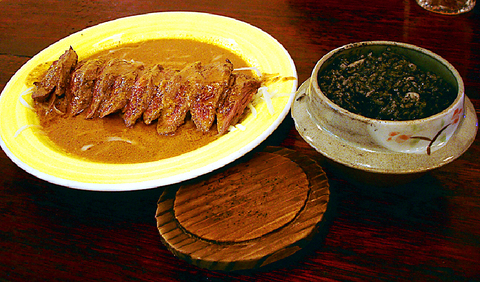I'm sitting at a long, low Japanese-style table surrounded by immaculate white cats shorn like poodles. The owner of 33 Rooms -- an extremely loud and eccentrically friendly late-middle-aged Taiwanese woman who peppers her Mandarin with Japanese -- has just stuck her cheek in my face. I'm running through homophones for qin in my head in case I misunderstood what she just said.
"Um, she wants a kiss," someone translates.
Once the deed is done, laobanniang -- who gives her name alternately as Chen Min-ching, Olive ("like Popeye's girl-friend"), and Ringleader Chen (陳老大), and whom everyone simply calls laobanniang -- traipses off into the other room. A moment later a group of people yells in unison, "May you have youth and beauty!"

PHOTO: CHRIS PECHSTEDT, TAIPEI TIMES
"Xie xie!" yells laobanniang.
This, it seems, is a pretty standard evening at 33 Rooms. Then Chen storms around the otherwise relaxing polished-wood interior, cussing out the staff and fraternizing with the customers. If you go (and if you don't mind dropping a big wad of cash), go prepared.
"People come for me, not for the food," she jokes in between kissing my hand and trying to set me up with another patron.
The food is excellent. Like everything else about 33 Rooms, it is a part of the owner's cult of personality.
There is no menu. When your group enters, you'll say how much you're willing to cough up, and whether there's anything you don't eat, and Olive will take care of the rest (read: make whatever she feels like). Typically, it starts off at NT$1,000 a head and goes up in increments of NT$500, but smaller budgets are accommodated.
The restaurant serves all sorts of Japanese food, especially beef, sashimi and other seafood, like chunks of a 50kg snow crab. There may be hotpot as well.
The results of 22 years of constantly changing the menu are apparent in the dishes, which are smallish but exquisite. The smallness isn't bad, either.

Cheng Ching-hsiang (鄭青祥) turned a small triangle of concrete jammed between two old shops into a cool little bar called 9dimension. In front of the shop, a steampunk-like structure was welded by himself to serve as a booth where he prepares cocktails. “Yancheng used to be just old people,” he says, “but now young people are coming and creating the New Yancheng.” Around the corner, Yu Hsiu-jao (饒毓琇), opened Tiny Cafe. True to its name, it is the size of a cupboard and serves cold-brewed coffee. “Small shops are so special and have personality,” she says, “people come to Yancheng to find such treasures.” She

Late last month Philippines Foreign Affairs Secretary Theresa Lazaro told the Philippine Senate that the nation has sufficient funds to evacuate the nearly 170,000 Filipino residents in Taiwan, 84 percent of whom are migrant workers, in the event of war. Agencies have been exploring evacuation scenarios since early this year, she said. She also observed that since the Philippines has only limited ships, the government is consulting security agencies for alternatives. Filipinos are a distant third in overall migrant worker population. Indonesia has over 248,000 workers, followed by roughly 240,000 Vietnamese. It should be noted that there are another 170,000

Hannah Liao (廖宸萱) recalls the harassment she experienced on dating apps, an experience that left her frightened and disgusted. “I’ve tried some voice-based dating apps,” the 30-year-old says. “Right away, some guys would say things like, ‘Wanna talk dirty?’ or ‘Wanna suck my d**k?’” she says. Liao’s story is not unique. Ministry of Health and Welfare statistics show a more than 50 percent rise in sexual assault cases related to online encounters over the past five years. In 2023 alone, women comprised 7,698 of the 9,413 reported victims. Faced with a dating landscape that can feel more predatory than promising, many in

“This is one of those rare bits of TikTok fitness advice with a lot of truth behind it,” says Bethan Crouse, performance nutritionist at Loughborough University. “Sometimes it’s taken a bit too literally, though! You see people chugging protein drinks as they’re scanning out of their gym.” Crouse recommends the athletes she works with consume 20-30g of protein within 30-60 minutes of finishing a resistance training session. “The act of exercising our muscles increases the breakdown of muscle proteins,” she says. “In order to restore, or hopefully improve them — and get gains such as increased muscle mass or strength —